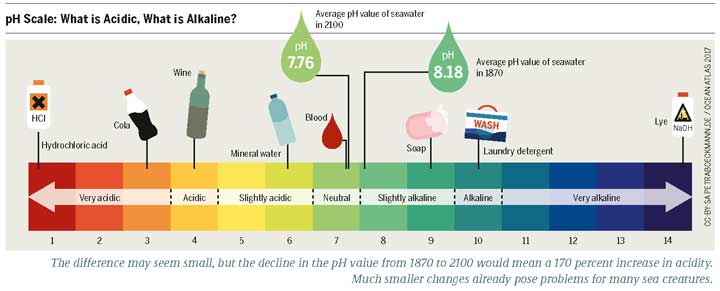It has to be said that one of the most frustrating things about our perennial quest for great tasting coffee is the fact that it is so hard to achieve it consistently. You can do the same preparation every day with the same measurements of coffee grounds and volume of water but the taste is hit or miss. Of course, there are numerous reasons for this. in this article, I will discuss one of the main reasons, acidity.
First of all, a little bit of science but please don’t let your eyes cloud over in boredom. I will keep it short and sweet. There is a scale that runs from 0 to 14 which measures a substance as either acidic at level 0, all the way through to alkaline at level 14. This number is referred to as the pH level of something.
Coffee in its natural form is essentially acidic. It has an average pH level of between 4.85 and 5.13 which is bordering between acidic and slightly acidic. The brewing process involved with coffee will release the following acids from the coffee bean oils. chlorogenic, quinic, citric, acetic, lactic, malic, phosphoric, linoleic, and palmitic.
This is not a problem in itself with regard to coffee flavor. However, it is about trying to balance out these acids to create a more rounded flavor profile of the coffee.
Factors That Increase Coffee Acidity
There is indeed more than one factor that increases the acidity in coffee before I discuss the main one about making coffee with alkaline water.
Coffee Bean Roasting
The coffee bean roasting process has an effect on the acidity of the coffee bean. A lighter roast will leave a lot more of the coffee bean oils (which are acidic) within the bean. A longer roast will remove more of the acid from these oils. Therefore, a lighter roast tends to be more acidic in nature.
Brew Temperature & Time
A cold brew coffee has been found to contain less acid than a hot brew. It is believed that a cold brew releases less of the coffee bean oils and hence acid into the brew. It is also believed that a shorter length of brewing time will be more acidic than a longer brew time.
Coffee Grounds
A finer grind on the coffee beans will tend to be more acidic. The finer particles will mean that the water extraction will release more of the acids into the brew. A coarse ground will be less acidic for the reverse reason. This is why espresso can have a tendency toward being acidic in nature if you are not careful.

Making Coffee With Alkaline Water
So how do you fix this excessive acidity that can be found in coffee? Obviously, carefully choosing a good quality coffee bean and adjusting the roast, brew temperature and time will make a difference. One of the biggest things that can help produce a much rounder and fuller flavor to your coffee is to use alkaline water.
Alkaline water will have a pH level of above 7 and the effect of making coffee with it is to balance out the pH of the coffee grounds which will be approximately pH 5.
The effect on the coffee brew is that with reduced acidity, the flavor notes that were being masked with an excessive citric taste will come to the fore.
How To Get Alkaline Water?
Fresh tap water has a natural pH of around 7 which is as neutral as you can get on the pH scale. It is neither acid or alkaline. To make water that has a higher alkaline level there are things that can be done to achieve this.
You need to add alkalising agents to your water. An alkalising agent can include potassium, magnesium, calcium and silica. Bicarbonate of soda is another good alkalising agent.
The simplest way is to buy an alkaline filter jug like this one.

This will produce great alkaline water for your coffee without all the fuss.
Does Coffee Really Taste Better With Alkaline Water?
I have tested this myself with the same coffee machine on the same day using the same coffee. One brew I made with ordinary tap water and the other using alkaline water from an alkaline water filter jug.
The results were conclusive for me. I created two espresso coffees and although both were great tasting in my opinion, but there was a clear winner. The espresso I made using alkaline water just had more richness of flavor. It had more levels of taste. It is difficult to explain in words and I urge you to try it yourself. For me, I am now a converted user of alkaline water. Straight out of the jug, because of the extra minerals I guess, there is a very slight salty taste but I quite liked it.
Health Benefits of Alkaline Water
The biggest benefit health wise is to people who suffer with excess acid in their stomachs. Using alkaline water in your coffee will not only help with improving the taste of your coffee beverage but will also help with excessive acid leading to reflux or indigestion.
Is It Safe To Bring Alkaline Water Daily?
As always, due diligence needs to be taken with health matters and always consult a doctor if you have any worries. In essence though, it is generally believed that it is safe but caution should be taken if you are not sure how the alkaline was made. Just be wary of contaminants from the extra minerals added to the water.
Does Alkaline Water Stay Alkaline When Boiled?
Yes, it does. The boiling process has no effect because of the micro-clustering of water molecules.
What Are The Downsides To Alkaline Water?
The use of alkaline water may increase the likelihood of an increased scale on your appliances. As always, you should consult your operating manuals to see if alkaline water is safe to use or not.
Verdict
I personally found that using alkaline water was a bit of a revelation in terms of coffee flavor. When used in conjunction with all other recommendations, like roasting, brew times and temperatures, it really does improve the coffee experience.


